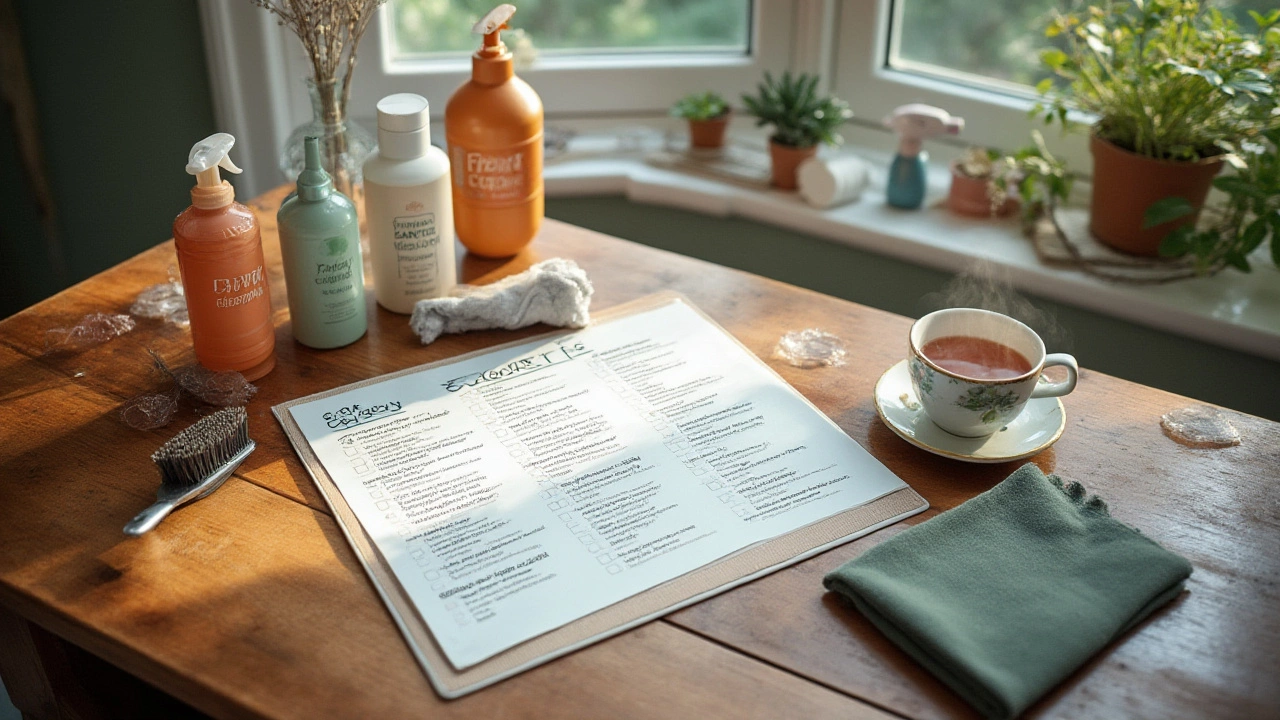Ever looked around your flat and thought, 'When did it get this grubby?' You're not alone. Most people wait until spring to break out the rubber gloves and go on a cleaning spree. But here's the kicker—waiting all year might be doing more harm than good. Dirt doesn’t exactly check the calendar before it sets up camp under your bed. And with everyone spending more time at home these days, dust, grime and bacteria get comfy faster than you think. Research from the London School of Hygiene & Tropical Medicine shocked everyone when it showed the average Brit has over 9,000 bacteria per square inch just on their kitchen surfaces. If that doesn’t make you want to clean right now, I don't know what will.
Why Spring Cleaning Still Matters
Spring cleaning has been around a lot longer than those pastel-scented cleaning products. In the UK and across Europe, the tradition goes back centuries, spring was the first chance to open up houses after winter, let fresh air rush in, and clear out months of soot and dust from fireplaces. These days, there are fewer fire soot problems but a lot more stuff. In 2023, a survey from YouGov found that 68% of UK adults said they felt less anxious in a tidy home. That’s no small thing. Modern life is full of clutter—think delivery boxes, shoes that multiply by the front door, receipts, and random mail — and all that stuff makes a regular deep clean even more important if you want your space to feel sane.
Mess isn’t just annoying to look at. Dust carries pollen, pet dander, mold spores, and all sorts of things you don’t want floating around if you’re prone to allergies. Even your mattress is a tiny zoo of dust mites—gross but true. The Asthma UK organization points out that these allergens are a leading trigger for allergic reactions and respiratory troubles. So, spring cleaning isn’t just about the smell of lemon-scented floors, but breathing easier year-round. According to the British Society for Allergy & Clinical Immunology, regular deep cleans can reduce allergy symptoms by almost 40%. That’s a proper reason to invest some elbow grease at least semi-regularly.
With people working from home more than ever, that divide between ‘work’ and ‘home’ spaces can blur. One study from the University of Exeter showed cluttered homes make it much harder to concentrate and keep stress levels higher. A regular spring clean declutters your physical space and helps clear a bit of mental clutter too. There’s a genuine psychological payoff. One therapist, Nicole Sullivan, said—
"A good deep clean isn’t just about the surfaces. It can really refresh your sense of control and calm in the space you spend most of your life.”
So even if you dread it, there’s a reason for the ritual.
How Often Should Spring Cleaning Actually Happen?
Here’s where it gets spicy. Experts don’t agree on one golden rule, but there are some clear patterns. Most cleaning pros in the UK recommend a deep clean much more often than once a year. You read that right. A proper spring clean every three to four months does wonders for hygiene, so think ‘spring, summer, autumn, winter’ rather than just one big spring blow-out. Sure, the term “spring clean” suggests once-a-year, but honestly, that model comes from days when homes were built differently and modern germs weren’t such a headache.
Smaller families or solo dwellers might get away with just twice a year, especially if your home doesn’t see much traffic or mud. But if you have kids, pets, allergies, or just notice things getting grimy, quarterly is a good target. A 2022 study by the British Cleaning Council found that homes with pets needed deep cleaning up to 30% more often to keep smells, pet dander, and shedding under control. And with small kids, the dirt-mystery multiplies—think biscuit crumbs behind radiators and entire sandboxes in the boot room.
Let’s get specific—
| Room/Area | Recommended Deep Clean Frequency |
|---|---|
| Kitchen (appliances, cupboards, floors) | Every 3 Months |
| Bathrooms | Every 3 Months |
| Living Room (including upholstery) | Every 6 Months |
| Bedrooms (mattress, wardrobes) | Every 6 Months |
| Windows | Every 6 Months |
| Carpets/Rugs | Every 6-12 Months |
It may sound like a lot, but when cleaning is broken up by season, it’s less overwhelming. The biggest secret: don’t let everything pile up. Set your calendar to nudge you if you’re the forgetful type.

Breaking Down the Perfect Cleaning Schedule
Feeling lost on where to start? You’re not alone. Loads of people walk in circles for half an hour just trying to decide where to begin. The trick is a solid plan that fits your lifestyle—not someone else’s. First, make a master list. Walk through each room with a cuppa and jot down every task, from scrubbing skirting boards to washing curtains. Be honest: if you can’t remember the last time you wiped behind the fridge, it’s definitely overdue.
Here’s a shortcut to a simple, no-nonsense cleaning schedule:
- Monthly: Wipe down skirting boards, deep clean bathroom grouting, descale showerheads, clean oven filters, sort through post and receipts.
- Quarterly: Launder duvets and pillows, scrub behind big furniture, clear out kitchen cupboards, deep clean appliances, treat stains on upholstery.
- Twice yearly: Wash curtains, steam clean carpets, polish silverware (if you’ve got it), clear the loft or storage cupboards.
- Yearly: Tidy up the garden shed/garage, check smoke alarms, clean gutters, declutter wardrobe.
Don’t try to do it all in one go—you’ll burn out, get crabby, or lose motivation. Spread big jobs across several days. Recruit your flatmates, partner, or kids if you’re unlucky enough to have them fighting over the TV remote. Add music and snacks for morale.
Another real-world tip: Set a timer. Even pros recommend the ‘twenty-minute’ rule—focus on one section for twenty minutes, then take a quick break. You’ll be shocked how much you can blitz through in a short burst. Lists and music make a good day of cleaning almost fun. OK, less painful at least.
The Hidden Health Benefits of Spring Cleaning
This is the part most people forget: a clean house is a healthier one. Getting rid of dust, grime, and bacteria means fewer chances to get sick. Households that skip deep cleans see more outbreaks of colds and stomach bugs, according to data from the NHS. Kitchens and bathrooms are the real battlegrounds. In fact, researchers at the University of Salford once found that the average kitchen sponge carries more germs than the toilet seat. Yikes.
Clutter also sneaks up on your mood. A study by Princeton University found messy rooms literally make it harder for your brain to focus, increasing stress. If you’ve ever tried to work with papers all over your desk and dirty mugs lurking around, you know what I mean. Freshening up your home literally freshens up your mindset.
Allergens thrive in carpets, curtains, and nooks and crannies you barely see. For anyone with hayfever or asthma (which, by the way, is about 1 in 11 people in the UK), a regular deep clean can ease symptoms dramatically. Even the simple act of opening windows during the process can flush out indoor pollutants and let in (sometimes chilly) Brighton air, which feels ace in April.
One extra point: spring cleaning isn’t only about scrubbing. It’s also a chance to check batteries in alarms, look for leaks or mould, and spot any dodgy wiring you’ve ignored. Sort all that once a year (or more if you’re handy), and you’ll avoid headaches later. So yes, the squeaky clean oven is great, but so is a house that won’t surprise you with bursts pipes or broken fans mid-winter.

Making Spring Cleaning Stick: Habits for the Long Haul
Here’s the real kicker: how do you keep a home fresh and clean after you’ve blitzed it? A single weekend overhaul might look brilliant for a week, but unless you change a few habits, mess creeps back in. The trick is routine.
Try quick resets every day—like ten minutes decluttering or a speedy wipe-down of high-traffic counters. Make it non-negotiable, like brushing teeth. Experts at Good Housekeeping recommend building small cleaning habits into your morning or evening: unloading the dishwasher before work, drying surfaces after a shower, even a speedy hoover in the high-traffic hallway. Stack these mini-tasks together and they won’t feel as tedious.
One last pro tip: supplies matter. Invest in decent microfiber cloths, a reliable vacuum, and eco-friendly products if you care about the planet (Brighton’s big on that, and for good reason). Replace sponges every couple of weeks—yes, even if they don’t look that bad. Keep baskets or boxes in key spots so you can do a quick sweep of stray socks and clutter without it feeling like a chore.
Remember, spring cleaning doesn’t need to be a guilt trip or a monster task you dread. Done little and often, it keeps your home fresh, your mind lighter, and your place somewhere you actually want to be. After all, isn’t it better to spend a sunny weekend on the Brighton seafront, not wrestling with the mop indoors?




